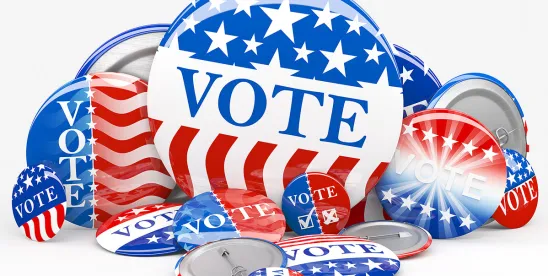With the 2024 election fast approaching, and political news exploding, manufacturers are asking an important question: What is the role of political bobbleheads, pins, stickers, and discussions in the workplace?
While public employers (i.e., government employers) are generally restricted from infringing upon employees’ free speech rights under the First Amendment of the U.S. Constitution, those same protections do not apply to employees working for a private employer. That being said, there may be protections under state and federal law.
Under several state laws, employees’ political affiliation or related activity is protected. For example, in California, no employer may make, adopt, or enforce any rule, regulation, or policy that forbids or prevents employees from engaging or participating in politics or becoming candidates for public office, or controls or directs the political activities or affiliations of employees. The law further provides that employers may not coerce or influence employees to adopt, follow, or refrain from adopting or following a particular political action or activity. Similarly, in Colorado, it is unlawful to prevent employees from forming, joining, or belonging to any lawful political party or to coerce employees because of their connection to a lawful political party. New York also mandates that an employer cannot take certain adverse actions or discriminate against employees for their political activities outside of working hours, off the employer’s premises, and without using the employer’s equipment or property if the activities are legal. Moreover, Washington, D.C., also prohibits discrimination based on political affiliation by statute, and other states have passed similar laws in addition to those mentioned. While these protections relate to political affiliation and activity rather than speech at the workplace, they reveal some states’ desire to shield employees from employer action in the realm of politics.
State laws may also tackle political speech in the workplace, including Connecticut, which has generally extended free speech rights to employees of private employers, subject to a few exceptions. Namely, Connecticut law establishes that a private employer cannot discipline or threaten to discipline an employee for exercising free speech rights guaranteed under the federal or state constitutions unless the speech substantially or materially interferes with the employee’s job performance or working relationship between the employee and employer.
Political speech can also be protected under other federal laws in certain circumstances. For instance, the National Labor Relations Act (NLRA) applies to union and nonunion workplaces alike and protects employees’ rights to engage in certain protected activities, regardless of whether they are part of a union. Namely, Section 7 of the NLRA protects an employee’s concerted activity for the purposes of mutual aid or protection, which is construed broadly and must relate to wages, hours, or other working conditions. Therefore, the NLRA could apply to concerted activity involving speech with a political message or a connection to political expression (e.g., fair wages, minimum wage increases, etc.). A recent example includes a National Labor Relations Board (NLRB) decision holding that an employer violated the NLRA when it terminated an employee, who had joined with others and refused to remove letters stating “BLM,” which stood for Black Lives Matter, from their work apron. In that decision, the NLRB indicated the marking was a “logical outgrowth” of prior concerted protests concerning racial discrimination in the workplace and an attempt to bring complaints to the employer’s attention.
Finally, employers (e.g., owners, leadership, etc.) must be careful if they engage in political speech including endorsing certain political candidates or views. This can create challenges in the workplace including animosity and isolation for those who may disagree, and can result in harassment, discrimination, and other issues. In addition, employers’ ability to mandate that employees attend meetings and listen to such speech may be prohibited under some state and even federal laws, depending on the circumstances.
With election season around the corner, political discussions and politics in the workplace are bound to increase. In anticipation, manufacturers should consider:
- Whether and how to implement a policy addressing speech in the workplace.
- Reminding employees about cooperation and respect in the workplace.
- Training managers on how to navigate such conversations or expressions should it arise.
- Ensuring that the workplace remains an inclusive environment where employees can work cooperatively and efficiently.
- Consulting with competent legal counsel if issues arise.




 />i
/>i
